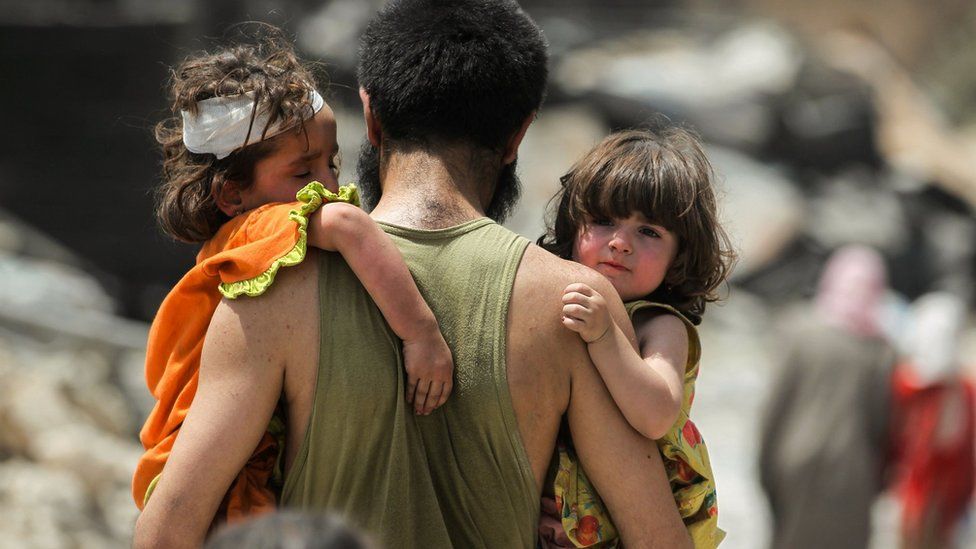Humanity under attack in Mosul, Red Cross says
- Published

The fog of war once again begins to sweep over Mosul General Hospital, with an announcement that crackles out of the loudspeakers.
An urgent, desperate warning repeated over and over again: "Mass casualty, mass casualty."
The latest civilian victims of the chaos in Mosul are on their way here. Forty-five Iraqis needing urgent medical care after yet more violence in the Old City.
I am surrounded by medics, who are preparing to help. But all I can do is grip my camera, because I am here as a public communications specialist with the International Committee of the Red Cross (ICRC).
I have come to Mosul to document what is happening, but what is happening soon overwhelms me.
I turn towards a little girl who has just been rushed inside.
I ask her name. Her aunt whispers to me that her name is Sakina. She is bleeding, so I call out to my colleagues for help.
I am not a medical worker and am already beginning to wonder: Is this serious? Will she survive?
I do not have to wait long to find out. Sakina has several wounds from an explosion.
My colleagues rush in to try to save her. Her aunt asks me to translate what the English-speaking medical team is saying, but she can see what is happening.
The medics try their best, but Sakina is dying in front us.
In Old Mosul, thousands of civilians are trapped and full of fear.
Air strikes, sniper fire, shelling and roadside bombs mean no place in the Old City is safe.
Residents are being forced to make impossible life-or-death choices as they seek to flee the violence.
Explosions shake the hospital, which lies only 1.5km (0.9 miles) from the frontline.
The staff say they do not feel in danger, but the workload is heavy. In early June they had three days in a row when 80 to 90 patients arrived all at once.
Hundreds of civilians arrive every week with terrible wounds.
Bomb blasts throw small stones deep into young bodies, a sickening kind of shrapnel that explodes up in anger from the very streets where these children used to run and play.
There is no child's play now. There are no fairy tales here. Mosul's young have been plunged violently into a real-life horror story that seemingly has no happy ending.
Parents are sucked into this horror story too - one with many chapters.
There is the father who carried his two-year-old into the hospital, suffering from a large gunshot wound to the head. And another who calmly asked a medical colleague for 22 body bags, because all of his family had been wiped out. A surgeon helped him with his request, but only after going behind a wall to cry.
Local staff are doing all they can. Some are not paid anymore, including the Iraqi medical team. Some receive incentives. Many do not, but they are still here helping. It is incredible.
I make a decision. I am here to take pictures, but I ask myself: "What am I doing behind my camera? I took some first aid courses so I am sure I can help, if only a little?"
Doctors begin giving me tasks: "Take the bandage." "Put pressure on the wound." "Quickly, over here."
I see another child who is wailing. I try to speak to her to calm her. She says: "I don't want to live without my mom. I wish I was the one who stepped on the mine."
Her face is full of shrapnel. It is the first time I have seen someone bleed from the eyes. She asks: "Am I blind?" She keeps screaming. She is terrifying everyone.
I am from Lebanon and I have seen lots of war. I am not afraid of shelling and shooting. But today I can see that our basic humanity is under attack.
I appeal to all sides in this conflict to protect civilians. Protect them all as if they were your own loved ones. Let them escape. Give them food, water and shelter. Respect the laws of war for the sake of all of us.
My thoughts once again turn to Sakina.
After she died, her aunt left the room and I followed. We cried together. I was hugging a total stranger but it felt like I was hugging my own aunt. She told me Sakina's mother and siblings had already been killed.
I now come face to face with Sakina's father, who has arrived at the hospital. He is calm, silent, but clearly deeply traumatised.
There is an Arabic saying: "There are a million words behind the silence." This is all too true as we look at each other, saying nothing.
Of the 45 patients who arrived at the hospital today, four died.
I take my camera, my pictures and my memories away with me at the end of a hot and horrendous day.
The work will go on. Patients will be cared for, beds will be changed. Floors will be cleaned. But the stain of what has happened here will not so easily be removed.